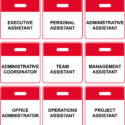
Become a role model and exercise positive leadership in your workplace, says Chiara Camangi
“Act as if what you do makes a difference. It does.”
William James
The last two years have witnessed a profound transformation in our workplaces. In our role as Assistants and facilitators to our managers, we can also become fundamental to the development of our workplaces into fair, happy and sustainable organizations.
My career development from Executive Assistant to certified Chief Happiness Officer (CHO) started during the COVID-19 pandemic. Like many of us, I suddenly found myself in a period of furlough imposed by the company. This unusual situation helped me to take the time I needed to realize what my skills and potential were, and to focus on the professional I wanted to become.
In my 10 years as Office Manager and EA to the CEO, I realized how much I was able to exercise my leadership abilities in a positive way. I actively contributed to the evolution of the organization and the creation of a corporate climate in which co-workers felt involved and appreciated. I understood how important it was to focus on people, their needs and qualities, and listening to their requests so that everyone could feel as happy as possible in the workplace. From the perspective of managing a complex organization, this attention and care for individuals resulted in a positive outcome in the work routine and in operating processes, which made it possible to reach quantified business goals.
As an Assistant, I was able to play a role in the wellbeing of many people in the organization. I had unwittingly approached the science of happiness and the role of Chief Happiness Officer without even knowing of its existence! The pandemic gave me time that I could use for myself, time to grow professionally and to explore new ways of being useful to my organization. For this reason, when I learnt about the training course to become a certified Chief Happiness Officer, I understood that this was exactly the career path I wanted to take. Today I am an EA and a certified CHO who is training and coaching Assistants within individual mentorship paths.
Although the CHO is often a professional who works in the HR field, there is no doubt that this role perfectly matches the skills of the Assistant. Working closely with our executives and their teams, we can become real change agents within the organization, and we can contribute to spreading new values such as respect, kindness and inclusion at all levels of the organization.
Who Is the Chief Happiness Officer?
- They are the manager of employees’ happiness; they ensure employee satisfaction and wellbeing and are the bringer of positive cultural transformation within the organization.
- They are experts in positive organizations. A positive organizationis a place where people flourish in relationship with others and obtain individual and collective results that make sense and exceed expectations.
- They drive change by means of an integrated approach, based on four fundamental areas of development. The CHO knows how to combine organizational processes with corporate behaviours and culture to create consistency and make wellbeing a solid organizational strategy.
- They are professionals capable of applying complex principles to human and organizational dynamics. They lead the way in a positive transformation process, having to hand a rich playbook of practices and tools validated by science and field research.
- They know that organizations are not machines, but living, complex and adaptive organisms, which are constantly changing through internal and external interactions. They understand that people have different and constantly changing needs, talents, values and skills.
In addition to having a broader view of the organization, it is also necessary to be able to look at the organization from within, in an integrated way. The Assistant, who supports the manager at the top of the organization, knows the organization’s internal dynamics very well, but also has the strategic view of its future development.
The Four Fundamental Areas of Development
1. Cultural transformation
The CHO promotes a cultural transformation by shifting the organization towards a strong purpose, anchored to collective objectives, capable of generating a social and ecological impact, promoting the common good.
2. Positive leadership
The CHO cultivates positive leadership because they know that there are no positive organizations without positive leaders.
3. Positive organization
The CHO manages the positive organization; they choose, design and manage processes and practices that are coherent with the identified strategy and that can generate wellbeing and a perception of consistency.
4. Corporate happiness
The CHO manages “corporate happiness”, which means they make happiness a strategic organizational priority.
Daily Practical Actions
Executive Assistants can also contribute to bringing about cultural change through daily practical actions, such as:
- Practising kindness, respect and emotional intelligence in the way they communicate with colleagues, customers and suppliers.
- Creating a positive environment where everybody feels acknowledged. Small gestures make a big difference, such as welcoming newcomers, greeting and thanking colleagues.
- Promoting active listening and the use of inclusive forms such as “we” when communicating.
- Organizing events or webinars to involve and connect employees.
- Promoting a company culture where each completed project or achieved goal is celebrated and shared with the whole organization, and where mistakes are not considered failures but chances to learn.
The Positive Organization
A positive organization promotes an organizational culture led by collective purposes and capable of generating a social impact while promoting the common good. It fosters the transition from models based on ego, separation, competition and profit to models based on interconnection, value and meaning.
A positive organization supports and develops leaders who are aware of their purpose, who view their role as a service to others and identify wellbeing as their routine. Assistants can use their personal leadership to serve the organization and support their executives to become positive leaders.
A positive organization cannot exist without positive leaders.
The Positive Leader
The traits and characteristics of a positive leader are:
- uses less “me” and more “we”
- expresses appreciation and recognition
- communicates and gives feedback in an authentic way
- cares for people’s health and wellbeing
- practises kindness and respect
- does not give orders
- is consistent
- has their own happiness routine
Happiness can be viewed as not just an emotion but a skill and, as such, it can be practised for the benefit of individuals and the entire social system. Researchers have suggested that while 50% of our happiness is determined by our genes and 10% by our life circumstances, 40% is determined by our daily activities and behaviour. This means that at least some of our happiness is within our control. According to research, the four pillars of happiness are: +Us/-Me, +Be/-Have, +Positive chemistry/-Negative chemistry, +Discipline/-Chaos.
An Assistant may help their manager to implement these four pillars, become a role model to exercise positive leadership in the workplace and even perform tasks which typically belong to the Chief Happiness Officer. An Assistant may play a key role in bringing about a cultural change, driving the evolution of the whole organization in a positive sense. Happiness becomes a real organizational priority: we perceive it as urgent and necessary now more than ever, since we know how beneficial it is for individual wellbeing, for the organization and for the ecosystem we live in.
Today I fully feel like a business partner, whose purpose is to help people, first and foremost Assistants, in their path of personal and professional evolution. I challenge them to embrace change towards happiness first and for everyone.
I perceive my evolution from Executive Assistant to CHO as natural, since I firmly believe that the Assistant is the one who has the strategic vision of the future of the organization and who can showcase new paths to create a more sustainable and happier workplace for everyone. Let’s explore the great potential in our role as Assistants and aim high: we can become mentors for our colleagues, our organisation, and even CHOs! We can make a difference; with our engagement and passion, we can help to improve the economic, environmental and social ecosystems we live in.
Translated from Italian by Samanta Dal Pane













This is a fantastic article and insight. Again proves what is in your title and loose the fluff to focus on your skills and superpowers that you bring to the table.
Plus we all more kindness and happiness in our workplace
X
Thanks Michelle for your interest in these relevant and innovative topics! We spend 1/3 of our time working, it is important to be in a positive working environment! If you have any curiosity, do not hesitate to contact me!
Brilliant article – I’ve had the sub-title ‘Fun Manager’ for a while but I love the idea of being a ‘Chief of Happiness’ as that is so important to the individual’s sense of wellbeing and the organisational success. Thank you for raising this.
It is important to understand the meaning of the role! The CHO is a professional capable of applying the principles of complexity applied to human and organizational dynamics. In this way it can guide the process of positive transformation by having practices and tools validated by science and research in the field!